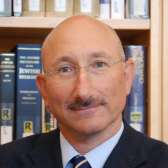
"Legacies of the Holocaust"
Professional Background
David Cesarani received a Ph.D. from Oxford University. During his tenure at the Museum, he was Research Professor in History and Director of Research at Royal Holloway, University of London. For his J.B. and Maurice C. Shapiro Senior Scholar-in-Residence Fellowship, Professor Cesarani conducted research for his project, “Legacies of the Holocaust.”
Professor Cesarani is a scholar of modern Jewish history and culture with a focus on the relations between Jews and non-Jews. He is the author of Eichmann: His Life and Crimes (William Heinemann, 2004), which was published in the United States as Becoming Eichmann: Rethinking the Life, Crimes, and Trial of a “Desk Killer” (Da Capo Press, 2006) and won the National Jewish Book Award in History for 2006; Arthur Koestler: The Homeless Mind (Free Press, 1999); Genocide and Rescue: The Holocaust in Hungary, 1944 (Berg Publishers, 1997); The Jewish Chronicle and Anglo-Jewry, 1841-1991 (Cambridge University Press, 1994); and Justice Delayed: How Britain Became a Refuge for Nazi War Criminals (William Heinemann, 1992). He is also the editor or co-editor of many publications, including, with co-editor Suzanne Bardgett, Belsen 1945: New Historical Perspectives (Vallentine Mitchell in association with the Imperial War Museum, 2007); After Eichmann: Collective Memory and Holocaust since 1961 (Routledge, 2005); The Holocaust: Critical Concepts in Historical Studies (Routledge, 2004); The Final Solution: Origins and Implementations (Routledge, 1996); and with Paul A. Levine, “Bystanders” to the Holocaust: A Re-evaluation (Frank Cass, 2002), among other works. He also published and worked with Steven Spielberg on The Last Days: Steven Spielberg and Survivors of the Shoah Visual History Foundation (Seven Dials, 2000). He is the former Director of the Institute of Contemporary History and Wiener Library, the largest Holocaust library in Great Britain. In 2005 the United Kingdom awarded him the O.B.E. for his work in Holocaust education and advising the government on the establishment of the Holocaust Memorial Day. At the time of his fellowship Professor Cesarani was co-editor of the journal Patterns of Prejudice and the Parkes-Wiener Series of books on Jewish studies, published by Vallentine Mitchell, and a Trustee of the Holocaust Memorial Day Trust.
Fellowship Research
During his tenure at the Center, Professor Cesarani advanced his book project which maps and interprets the legacy of the genocide against the Jews. Over the years there has been a growth of scholarly studies on many aspects of this legacy, such as the return of the survivors, restitution, historiography, the emergence of “the Holocaust” as a subject in popular culture, political controversies, memory and commemoration, and the transmission across the generations of the Jewish experience under the Nazis. The literature is so large that it needs to be synthesized for the benefit of non-specialists and students, but it also needs to be interpreted and, in certain cases, tested against primary sources.
In particular, Professor Cesarani’s research focused on the period 1945-1955 and asked several important questions. During this formative period was there really a “silence” about what we now understand as the Holocaust? Or was the mass murder of the Jews explored and articulated in ways that we would not recognize today, in places that historians overlooked when they came to write accounts of both the war years and the aftermath? Was the relative absence of historical writing about the persecution and mass murder of the Jews actually a side-effect of Jewish powerlessness after 1945? These questions are critical for evaluating explanations for the “emergence” of the Holocaust as a subject for scholarly attention and the explosion popular interest from the mid-1980s onwards. Was the Eichmann Trial really a pivotal event in this respect? Was “the Holocaust” something “constructed” after 1967 largely by Jews for their interests, notably in the defense of Israel and Zionism, as some historians allege? Why was there so much “unfinished business” such as the prosecution of Nazi war criminals and collaborators, the restitution of “Nazi gold,” reparations, and compensation for slave laborers (all causes that required political action to achieve a solution with the result that the Holocaust became a news story throughout the 1990s)? To some commentators all of this amounted to evidence of a “Holocaust industry.” Professor Cesarani’s work tested whether there is, or ever was, such a concerted, global effort to foreground post-Holocaust era issues. He asked whether the fascination with the Nazi years and their centrality in politics and culture have other reasons that are, in fact, nothing at all to do with the Jews but are, rather, a symptom of the end of the Cold War, globalization, “mediazisation,” currents in ethical thinking, an obsession with memory and representation, and the re-eruption of genocide in Europe and Africa at the end of the twentieth century.
Professor Cesarani was in residence at the Mandel Center from September 1, 2008 to May 30, 2009.
